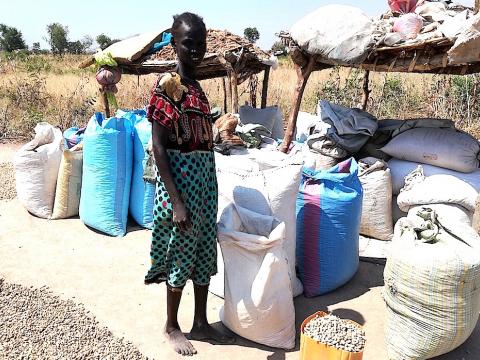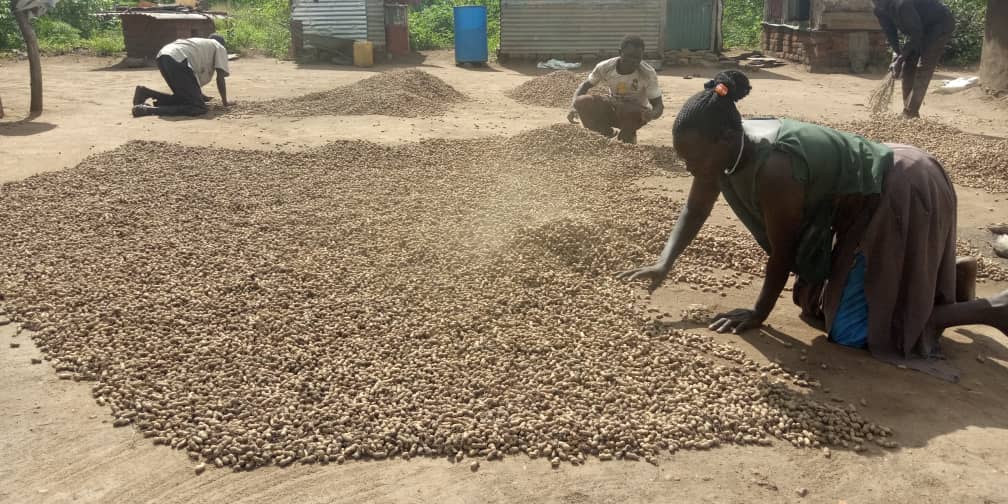Rural women winning the food security challenge in South Sudan

“The simple way of planting the groundnuts neatly in a row has increased my production”, says Aguek Bolbang, a 32-year old of four in South Sudan’s Kuajok town. As a single mother, she was in the priority list to receive support from World Vision’s Cash for Assets Project in Warrap State.
Aguek received US$ 40.5 daily for 15 days of working in the community farm. The money is paid in South Sudan’s local currency. “My income has improved my family’s life. I am able to buy school uniform and pay the school fees of my two children”, she adds.
The project Building Resilience through Assets Creation and Enhancement (BRACE II) is funded by the Department of International Development (DFID) and UKAID since February 2018 to support 12,680 households in the former states of Warrap, Northern Bar-el Ghazal and Magwi and strengthen the community efforts against hunger.

Among them are Aguek’s and Rose’s families. Both are single mothers who struggled for years to feed their children and send them to school. BRACE II came at the right time.
Before benefitting from the project, Aguek tilled the land but it always suffered poor harvest. In 2017, she harvested a measly three sacks of ground nuts for her hard work. This year, after learning new skills and using the cash assistance to hire farm hands to help her, she harvested 10 sacks. It was the first time she harvested this much.
“BRACE II makes a big difference in our lives as farmers because it provides us with cash and new techniques. The money enables us to buy our basic needs at home such as salt, sugar and many others. I do not have to spend time collecting firewood to sell in the market because we have available food. I can focus in my farm”, Aguek shares with pride.

By teaching them to manage their cash assistance well, the project improved the way the women plan for their household needs and even their harvest. “In the future, we aim to establish a small business from the support of World Vision so we can continue building our children’s future”, she says.
“I was overwhelmed with joy when I became a part of BRACE II. Life has been difficult for me, being a mother of six children. We often have nothing to eat and no means to support our children. I left everything to God’s grace with no hope for the future”, 37-year old widow Rose Lio says.
“I struggled for food and can hardly send my children to school. Most of the time I asked them to stay at home. How could I send them to school on empty stomach? It was not easy being a mother seeing one’s children suffer from hunger”, she adds.

Rose was able to cultivate her land with the project’s support and was provided with seeds and tools. The money she got was spent on food and her children’s school needs. She saved the money she was being paid monthly and bought chicken to raise and sell in the market. It became an extra livelihood for her and a source of food for her children.
“The support is a dream come true. I never thought I would be able to take care of my family. I almost lost hope”, she says. World Vision implements this food security program in partnership with Agency for Transformation, Peace and Development (SPEDP) and Smile Again Africa Development Organization (SAADO).
“The families have realized they are capable to build their own resilience than depend on free handouts all the time. The project has helped change their attitude and build their confidence. This is a more sustainable approach in fighting hunger and poverty in South Sudan”, says Kenneth Munyengerwi, Project Director of BRACE II.

“We commit to support communities in enhancing their own food security. It requires hard work but it is also rewarding as families are able to feed themselves in the future”, he adds.
“I am so encouraged this project has improved the livelihoods of communities within a short period of time. Now that there is hope for peace, we need more of these projects to end hunger in South Sudan”, says Malachi Owino, the Project Manager of SPEDP.